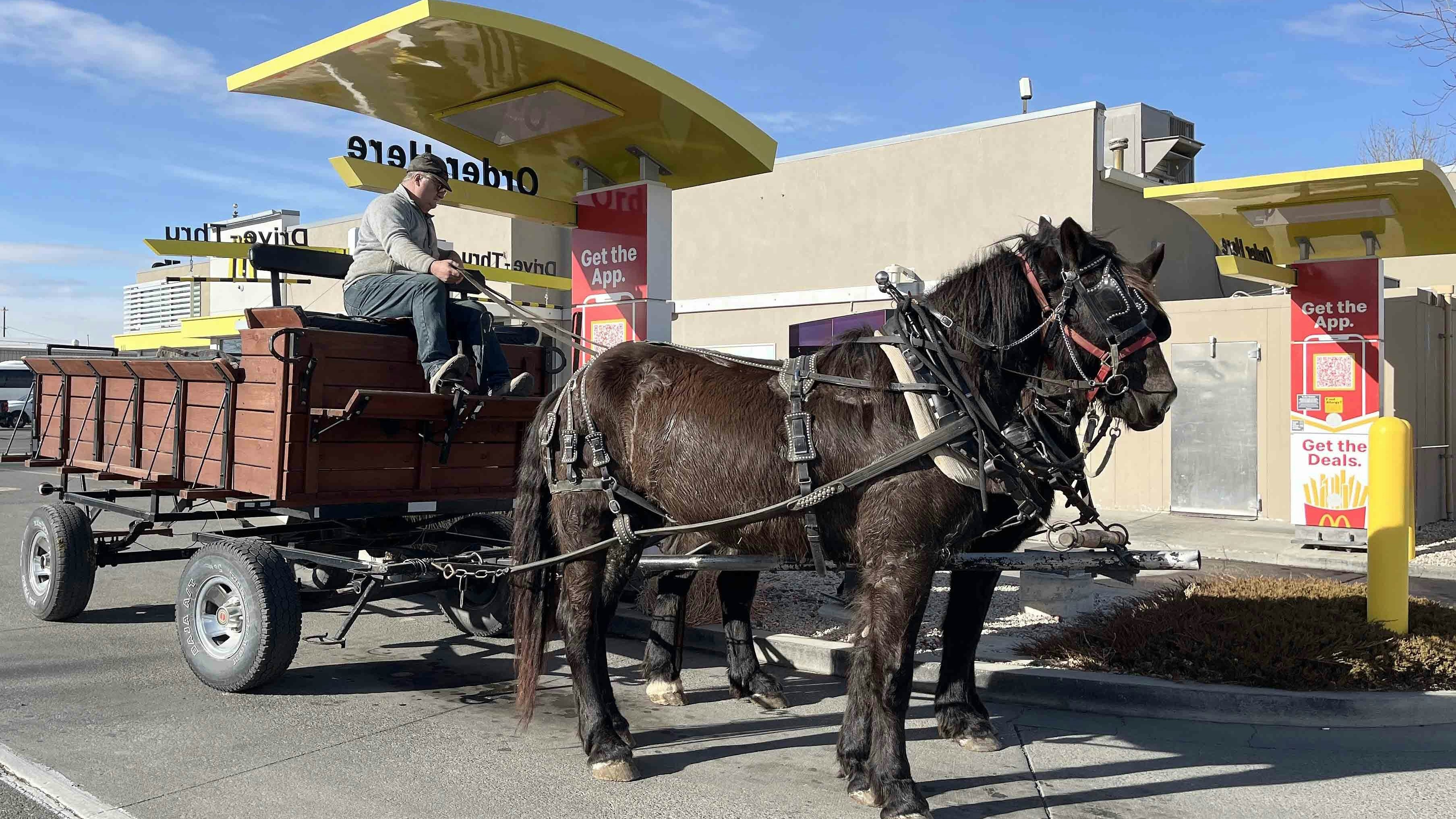At the Brinton Museum in Big Horn, Wyoming, not all the exhibits are static.
While they feature paintings and sculptures, in a small building on the museum grounds, master craftsman James Jackson of Sheridan, Wyoming, displays his leathermaking craft to museum visitors.
Jackson, a recipient of the National Heritage Fellowship award in 2019, can be found on his workbench, his head bowed over the leather as a flower comes to life with each move of his hand-crafted tool.
“It's just shallow relief sculpting,” Jackson told Cowboy State Daily as he switched tools and made another mark on the leather.
He held the piece up so his small audience could see the flower that was beginning to take on exquisite detail.
“They call it ball relief,” he said. “I'm just using cowhide instead of wood or a different material.”
Jackson explained how the craftsmen must be sensitive to what his tools can do and be aware of how hard to press on the leather.
Hundreds of specialized tools line his wall and are near at hand in a drawer by his workstation. Some of his favorite tools he made from nails when he was just a teenager, and others were bought from other craftsmen.
“I've got about 60 different center stamps,” Jackson said. He indicated a finished leather-bound album, adorned with numerous flowers and vines. “You can see there are different centers on those flowers.”
Jackson is also conscious of the moisture content which is crucial to each finished piece.
“You will not get that nice brown color if it's too wet or too dry,” Jackson said.
Uniquely Sheridan Art
Jackson’s flower designs, known as the Sheridan Style, were learned from Don King at Kings Saddlery. Jackson said he had been blessed to have learned the leather trade from his own father and then to work with King and other craftsmen since he was a teenager.
Jackson even earned his own maker’s mark from King after ten years of tooling and using the Sheridan style on the saddles and other leather pieces in the basement of the shop. It began as a uniquely Wyoming artform.
“The Sheridan style has to do with how that stem work pulls your eye through the pattern,” Jackson said. “Don King was most concerned with the flow of the patterns.”
The old Porter style, Jackson said, was about much bigger flowers and not as intricate while the old Visalia style had more bouquets and less stem work.
“When I started tooling and carving, it was with guys like Bill King, Don’s son, and the next generation,” Jackson said. “We had already started taking the Sheridan style and refining what Don had done. We took it in our own directions with our own tools that we were making.”
Jackson said that the team of craftsmen at King Saddlery were like a family, and he learned the trade from these dedicated carvers.
“The Sheridan style became something that was different from some of those older styles, and it was an art movement,” Jackson said. “The basic design became recognizable and now we have some of the Japanese craftsmen carving in it.”
These artists are also taking the concept into a different direction and Jackson celebrates their innovation. For over two decades, Jackson has traveled overseas to mentor these craftsmen and is pleased to see how they have made the Sheridan style their own by incorporating their culture into the designs.
Cultural Exchange
PBS will soon be releasing a documentary created by Sheridan Travel & Tourism about this cultural exchange between Japan and the town of Sheridan that Jackson has been a part of.
“The carving and tooling that developed from the Sheridan style carving is very popular in Japan, and it's all over the island,” Jackson said. “In the documentary, we went all the way from north of Tokyo down to Hiroshima to visit the shops where I've been teaching over there off and on for over 20 years.”
Jackson has been teaching seminars, classes and individual coaching to his Japanese students who have enthusiastically embraced the art form. He lays out patterns for the students to study and shows them the different styles of flowers.
“I teach for just two or four hours, just like I do over here, and lay out patterns,” Jackson said. “I show them the old Porter style, Sheridan style, and Visalia style and the subtle differences between those different styles.”
Learning From The Best
One of Jackson’s goals is to encourage the next generation of leather carvers. He said he was fortunate to work for the likes of carvers at old Ernst Saddlery and then with Don King, Chester Hape, and Billy Gardner and wants to pay that forward.
“Billy Gardner was one of the finest carvers that ever came down the road,” Jackson said. “He was working in the shop when I was in high school, and my father was pretty good, too. I didn't realize that I got to learn how to carve and tool from a guy that was probably the best.”
When Jackson headed off to the University of Wyoming, King asked him to do some tooling for his company and so he paid his way through college by the trade he had learned from his dad.
“I was learning to be a painter and after I got a master's degree, I taught at the university a little bit and then worked as curator of exhibits at the University of Wyoming Art Museum,” Jackson said.
However, the leatherwork kept tugging at him and Jackson returned to Sheridan where he ended up having two careers.

Two Arts Melded Into One
Jackson worked for King’s Saddlery for 30 years, crafting their custom work and painting in the evenings. The Kyle Belding Gallery in Denver sold these paintings for him so that, in his words, he was ‘one busy guy.’
“I had a shop at home, and I was doing some leatherwork,” Jackson said. “Over time, they just sort of melded and came together.”
Jackson’s primary work these days consist of carving a leather panel and then painting it to create a unique piece of art. When he retired from King’s Saddlery, he planned to just work at his home studio but then The Brinton Museum in Big Horn invited him to set up a shop on their museum property.
“The reason I'm out here at The Brinton was because I knew the history of the leather trade here,” Jackson said. “And I’m well-connected since I’m both a craftsman and a painter.”
Jackson was painting abstract paintings and will be featured in a retrospective at the Brinton Museum in March.
“You’ll be able to see work I did back in graduate school when I was at the university and people will be a little bit shocked at the different directions I went with my paintings,” Jackson said. “Actually, the patterns I use and lay out in my leather work have a lot to do with how I work with my paintings as well.”
Jackson begins with a structure and will then start connecting lines to develop an art piece. He does not always know what the subject matter of the painting will be until he gets into the structure of it, and then he allows the lines to dictate what he does with the painting.
“It's a complicated process, but I enjoy it,” Jackson said. “I'm just one of those lucky people, that's doing something that I love to do.”
Jackie Dorothy can be reached at jackie@cowboystatedaily.com.
















